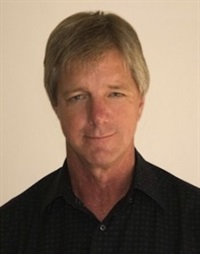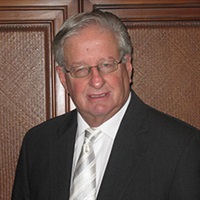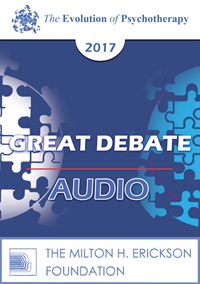EP17 Great Debates 07 - Cognitive vs Experiential Emphases - Stephen Gilligan, PhD and Donald Meichenbaum, PhD
Credit Available - See Credits tab below.
Total Credits: 1.5 including 1.5 A.P.A.
- Average Rating:
- Not yet rated
- Topic Areas:
- Great Debates | Cognitive Behavior Therapy (CBT) | Experiential Therapy | Psychotherapy
- Bundle(s):
- Learning Track - EP17 CBT Download | Learning Track - EP17 Erickson Download
- Categories:
- Evolution of Psychotherapy | Evolution of Psychotherapy 2017 | Evolution of Psychotherapy CBT Learning Track | Evolution of Psychotherapy Erickson Learning Track | Online Continuing Education
- Faculty:
- Stephen Gilligan, PhD | Donald Meichenbaum, PhD
- Duration:
- 1:19:30
- Format:
- Audio Only
- Original Program Date:
- Dec 14, 2017
- License:
- Never Expires.
Description
Description:
This exchange will focus on the classic question of whether good therapy should focus more on cognitive or experiential changes. The merits of each, and the possibility of a “both/and” partnership, are considered.
Educational Objectives:
- Compare and contrasts strengths and weaknesses of both cognitive and experiential approaches.
- Identify methods for integrating the two styles.
*Sessions may be edited for content and to preserve confidentiality*
Credits
1.5 credits available.
The Milton H. Erickson Foundation, Inc. is approved by the American Psychological Association to sponsor continuing education for psychologists. The Milton H. Erickson Foundation, Inc. maintains responsibility for this program and its content.
THE MILTON H. ERICKSON FOUNDATION Policy on Disclosure
The Milton H. Erickson Foundation is proud of the conferences and other
educational opportunities it sponsors, taking care that the conduct of
these activities conforms to the standards and principles of behavioral
and medical sciences, thus ensuring balance, independence, objectivity
and scientific rigor in all individually sponsored or jointly sponsored educational
activities.
All faculty members participating in a sponsored activity, and those who
review and therefore are in control of content, are requested to disclose
any relevant financial relationship prior to the CME activity, including but
not limited to specific commercial interests, financial remuneration received
by faculty member or spouse, and what role or activity was performed
for this remuneration. If a conflict of interest exists as a result of
a financial relationship it will be resolved prior to the activity. A faculty
member will not be allowed to present if the conflict is not or cannot be
resolved.
Faculty

Stephen Gilligan, PhD Related Seminars and Products
Stephen Gilligan Ph.D., is a Psychologist in Encinitas, CA. He was one of the original NLP students at UC Santa Cruz; Milton Erickson and Gregory Bateson were his mentors. After receiving his psychology doctorate from Stanford University, he became one of the premier teachers and practitioners of Ericksonian hypnotherapy. This work unfolded into his original approaches of Self-Relations and Generative Self, and then further (in collaboration with Robert Dilts) into Generative Coaching. These different traditions have all been updated and integrated into the present Generative Change Work, which includes the applications of Generative Coaching, Generative Psychotherapy, Generative Trance, Hero’s Journey, and Systemic Change work.

Donald Meichenbaum, PhD Related Seminars and Products
Donald Meichenbaum, Ph.D in Clinical Psychology is currently Research Director of Melissa Institute for Violence Prevention, Miami (melissainstitute.org). He is one of the founders of cognitive behavior therapy. He was voted one of the most influential psychotherapists of the 20th century. Latest books include "Roadmap to Resilience" (www.roadmaptoresilience.com) and "Evolution of Cognitive Behavior Therapy: A Personal and Professional Journey."


